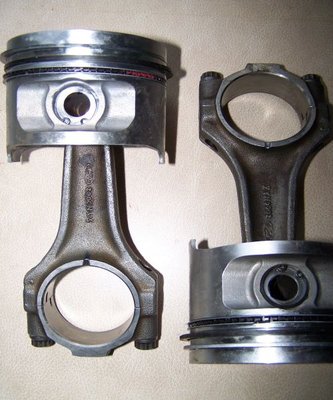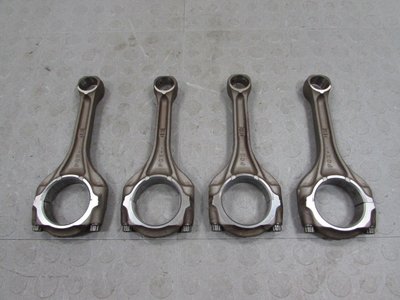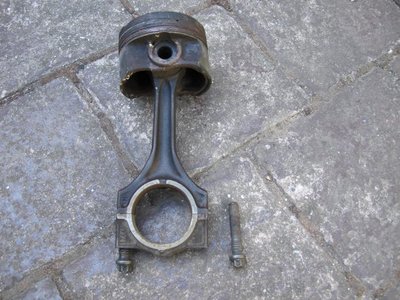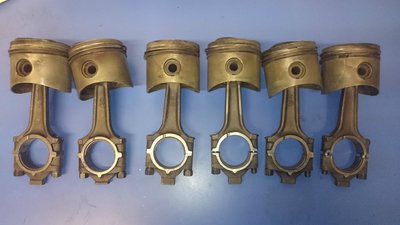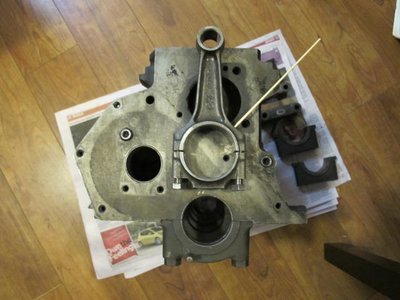Connecting rod oiling provision
10 posts
• Page 1 of 1
Hi Guys,
I'm currently in the process of having some steel conrods made up by Saenz. So far they have been great to deal with and are quite happy to produce customised rods without cost penalty.
One of the aspects I am currently considering is the oiling provision in the conrod for splash lubrication of the cylinder wall and/or small end bearing. Since the engine is mainly for road use and hence may encounter periods of idling and low speed/high load operation I'm thinking that it would be wise to incorporate some form of oiling provision. Most OE engines have an oiling provision of some type so I'm sure it's there for a good reason.
I'v conducted some research at home, the wreckers and the internet in regards to what is commonly out there and observations so far are as follows (sample pictures attached):
1. No modern engines (at least quality ones!!) have an oil drilling in the side like the original Lotus rod. On the original rod the provision seems to be for lubrication of the piston thrust surface rather than the small end because of the hole's position and angle - see wooden skewer.
2. Modern engines have a slot or slots on the face of the journal to facilitate the leakage oil from the big end being directed to specific areas. I'm not sure whether the intention is to direct this oil to the underside of the piston crown and small end, the piston thrust surface or both. There are typically 3 types of slot arrangements used by modern engines.1. Single slot in line with connecting rod centre, 2. Single slot to the left of the connecting rod centre. 3. Two slots to the left and right of the connecting rod centre (the high revving Honda S2000 engine has this). The slot arrangement is identical on either face of the connecting rod.
So my question is - what do I specify for my engine? It won't be an oil drilling but what sort of slot arrangement would be optimal? Any opinions would be greatly appreciated.
I'm currently in the process of having some steel conrods made up by Saenz. So far they have been great to deal with and are quite happy to produce customised rods without cost penalty.
One of the aspects I am currently considering is the oiling provision in the conrod for splash lubrication of the cylinder wall and/or small end bearing. Since the engine is mainly for road use and hence may encounter periods of idling and low speed/high load operation I'm thinking that it would be wise to incorporate some form of oiling provision. Most OE engines have an oiling provision of some type so I'm sure it's there for a good reason.
I'v conducted some research at home, the wreckers and the internet in regards to what is commonly out there and observations so far are as follows (sample pictures attached):
1. No modern engines (at least quality ones!!) have an oil drilling in the side like the original Lotus rod. On the original rod the provision seems to be for lubrication of the piston thrust surface rather than the small end because of the hole's position and angle - see wooden skewer.
2. Modern engines have a slot or slots on the face of the journal to facilitate the leakage oil from the big end being directed to specific areas. I'm not sure whether the intention is to direct this oil to the underside of the piston crown and small end, the piston thrust surface or both. There are typically 3 types of slot arrangements used by modern engines.1. Single slot in line with connecting rod centre, 2. Single slot to the left of the connecting rod centre. 3. Two slots to the left and right of the connecting rod centre (the high revving Honda S2000 engine has this). The slot arrangement is identical on either face of the connecting rod.
So my question is - what do I specify for my engine? It won't be an oil drilling but what sort of slot arrangement would be optimal? Any opinions would be greatly appreciated.
- Attachments
-
- Early 90's BMW M3
- bmw-m3.jpg (63.79 KiB) Viewed 2907 times
1970 Ford Escort Twin Cam
1972 Ford Escort GT1600 Twin Cam
1980 Ford Escort 2.0 Ghia
Peugeot 505 GTI Wagons (5spdx1) (Autox1)
2022 Ford Fiesta ST.
1972 Ford Escort GT1600 Twin Cam
1980 Ford Escort 2.0 Ghia
Peugeot 505 GTI Wagons (5spdx1) (Autox1)
2022 Ford Fiesta ST.
- 2cams70
- Coveted Fifth Gear

- Posts: 2170
- Joined: 10 Jun 2015
2 Cams,
This is really a question for an engine design engineer. Sadly that is not me, but my understanding is that the upwards oil spray has two functions.
1 to cool the piston.
2 lubrication of the gudgeon pin and cylinder wall.
All the examples you have are from engines with a good reputation. The variety tends to make me think that it does not matter that much.
Richard Hawkins
This is really a question for an engine design engineer. Sadly that is not me, but my understanding is that the upwards oil spray has two functions.
1 to cool the piston.
2 lubrication of the gudgeon pin and cylinder wall.
All the examples you have are from engines with a good reputation. The variety tends to make me think that it does not matter that much.
Richard Hawkins
- RichardHawkins
- Coveted Fifth Gear

- Posts: 1283
- Joined: 05 Jul 2008
I had a set of rods built by Pauter Engeineering in California. We used the 125E rod as the example, but, used side reliefs for the upper cylinder oiling. Engine has seen 7800-8000rpm regularly with no ill effect for the past 4 yr. (yearly teardowns of course!). They build rods for many trick racing and exotic engines, in both 4130 steel and titanium. The most amazing thing was that the custom 4130 rods were a bit less expensive than Carillo, and they could actually deliver them in 4 weeks. Carillo was 8-10weeks .
I have no connection with them other than a very nice set of connecting rods .....
.....
http://pauter.com/parts/rods/
I have no connection with them other than a very nice set of connecting rods
http://pauter.com/parts/rods/
Brett Engel
'67 Elan VR, '52 MGTD, '16 MX5 Club
Phoenix, AZ
'67 Elan VR, '52 MGTD, '16 MX5 Club
Phoenix, AZ
- brettengelaz
- First Gear

- Posts: 19
- Joined: 19 Sep 2011
The Carrillo rods I have used for many years have no oiling slots or hole. So their presence or absence in a twin cam does not seem critical. The size of the hole on the 125E rod says the amount of oil that would come out of it is small versus the amount that is flying around in the sump and coming of the bigends at high speed in all directions and lubricating everything in sight
cheers
Rohan
cheers
Rohan
-

rgh0 - Coveted Fifth Gear

- Posts: 8409
- Joined: 22 Sep 2003
Hi Brettengellaz,
Thanks for posting the picture of the Pauter rod. Seems to have a similar oiling provision as an OE Honda rod. Did you have the oil slots custom made into the rod or are they included as standard with a Pauter rod? Did Pauter offer any reason as to why they used this particular slot arrangement?
I'm sure the slots aren't necessary in a race engine operating at high speed all the time but I'm not so sure for a road engine.
Thanks for posting the picture of the Pauter rod. Seems to have a similar oiling provision as an OE Honda rod. Did you have the oil slots custom made into the rod or are they included as standard with a Pauter rod? Did Pauter offer any reason as to why they used this particular slot arrangement?
I'm sure the slots aren't necessary in a race engine operating at high speed all the time but I'm not so sure for a road engine.
1970 Ford Escort Twin Cam
1972 Ford Escort GT1600 Twin Cam
1980 Ford Escort 2.0 Ghia
Peugeot 505 GTI Wagons (5spdx1) (Autox1)
2022 Ford Fiesta ST.
1972 Ford Escort GT1600 Twin Cam
1980 Ford Escort 2.0 Ghia
Peugeot 505 GTI Wagons (5spdx1) (Autox1)
2022 Ford Fiesta ST.
- 2cams70
- Coveted Fifth Gear

- Posts: 2170
- Joined: 10 Jun 2015
Sorry Brettangalez,
Forgot to ask - Are both sides of the Pauter connecting rod double slotted or just one?
Regards
Forgot to ask - Are both sides of the Pauter connecting rod double slotted or just one?
Regards
1970 Ford Escort Twin Cam
1972 Ford Escort GT1600 Twin Cam
1980 Ford Escort 2.0 Ghia
Peugeot 505 GTI Wagons (5spdx1) (Autox1)
2022 Ford Fiesta ST.
1972 Ford Escort GT1600 Twin Cam
1980 Ford Escort 2.0 Ghia
Peugeot 505 GTI Wagons (5spdx1) (Autox1)
2022 Ford Fiesta ST.
- 2cams70
- Coveted Fifth Gear

- Posts: 2170
- Joined: 10 Jun 2015
Exactly the reason that the holes are closed off on FF engines - and they are dry sumped.
Lee
Lee
rgh0 wrote:The Carrillo rods I have used for many years have no oiling slots or hole. So their presence or absence in a twin cam does not seem critical. The size of the hole on the 125E rod says the amount of oil that would come out of it is small versus the amount that is flying around in the sump and coming of the bigends at high speed in all directions and lubricating everything in sight
cheers
Rohan
- sevenhead
- New-tral
- Posts: 11
- Joined: 04 Mar 2009
Hi Guys,
I think I'll have to put it down to being a bit of a mystery about the design of these oiling provisions. I do think however that they do serve some purpose, currently unknown, on a road going engine otherwise the OEM's would not put them in there. Using a squirt hole side drilling seems to be an obsolete practice now for most of the OEM's and replaced by either a side slot of some description in 90% of current OEM rods or by a central pressurised oil drilling through the conrod beam to the small end (seen this on a disassembled late model VW Golf engine).
The OEM's spend countless $$ on R&D and dyno testing during engine development and I'm sure they would not include a provision if it was not necessary on an engine designed primarily for normal road use.
Regards
I think I'll have to put it down to being a bit of a mystery about the design of these oiling provisions. I do think however that they do serve some purpose, currently unknown, on a road going engine otherwise the OEM's would not put them in there. Using a squirt hole side drilling seems to be an obsolete practice now for most of the OEM's and replaced by either a side slot of some description in 90% of current OEM rods or by a central pressurised oil drilling through the conrod beam to the small end (seen this on a disassembled late model VW Golf engine).
The OEM's spend countless $$ on R&D and dyno testing during engine development and I'm sure they would not include a provision if it was not necessary on an engine designed primarily for normal road use.
Regards
1970 Ford Escort Twin Cam
1972 Ford Escort GT1600 Twin Cam
1980 Ford Escort 2.0 Ghia
Peugeot 505 GTI Wagons (5spdx1) (Autox1)
2022 Ford Fiesta ST.
1972 Ford Escort GT1600 Twin Cam
1980 Ford Escort 2.0 Ghia
Peugeot 505 GTI Wagons (5spdx1) (Autox1)
2022 Ford Fiesta ST.
- 2cams70
- Coveted Fifth Gear

- Posts: 2170
- Joined: 10 Jun 2015
2Cams,
Agree. Anything the manufacturer can do to reduce the cost of a part and simplify it for manufacture and installation, they will most certainly do if it can be economically or engineering justified.
Regards,
Dan
Agree. Anything the manufacturer can do to reduce the cost of a part and simplify it for manufacture and installation, they will most certainly do if it can be economically or engineering justified.
Regards,
Dan
There is no cure for Lotus, only treatment.
-

StressCraxx - Coveted Fifth Gear

- Posts: 1284
- Joined: 26 Sep 2003
I agree modern manufacturers would not put in something that is not necessary for a modern motor.
But a twink is not a modern motor with the block design being more than 50 years old and experience says the oiling hole is not critical I believe in both road and more highly developed race applications.
cheers
Rohan
But a twink is not a modern motor with the block design being more than 50 years old and experience says the oiling hole is not critical I believe in both road and more highly developed race applications.
cheers
Rohan
-

rgh0 - Coveted Fifth Gear

- Posts: 8409
- Joined: 22 Sep 2003
10 posts
• Page 1 of 1
Total Online:
Users browsing this forum: No registered users and 22 guests

